#JAM Creative Productions
Explore tagged Tumblr posts
Audio
(kcmike)
2 notes
·
View notes
Note
Hey, I’m new to Tumblr, but I’ve seen your characters around the internet and I love them so much!! Everyone has so much love for Machete and Vasco and your art is so cool to see! Do you have any tips for an aspiring artist and creative writer?
Hi! Welcome to tumblr! I'm glad to hear you like my dogs :]
I'm not really a writer, and I also completely lose my confidence when I'm trying to explain my art processes. So this is probably an obvious, unhelpful platitude at best, but one thing I've realized is that you should allow yourself to be self-indulgent. If you're the primary target audience of your own work, it generates passion and keeps you inspired and motivated. I like to believe that people who see your creations are more likely to respond to them positively if they can sense that you're putting your heart and soul to them.
#if you have any special interests that you're really knowledgeable about you can try including them in your art/writing somehow#even if it seems kind of an odd match they may merge into an interesting and potentially unique combination#like this Vaschete era I'm going through is a product of lifelong interest in animals history art and religion#just jamming all of my favorite topics and themes in there#be forgiving to yourself when things fon't work out as smoothly as you had hoped#and try to cultivate a positive relationship with the creative process and end results#meaning if you have a habit of putting yourself down and saying your art/writing sucks#try not to do that#it can lead you to resent the whole hobby and stifle your potential#I dunno this probably comes across so vague and nebulous#answered#sagepuca#tldr: be excited about whatever you create#make art/stories that you yourself would look at and think 'this is the coolest thing it's like it was tailored just for me'#also like I'm just some guy you don't have to take my advice these are just some things that have helped me personally#your experience and approach might be different
141 notes
·
View notes
Text
studio facilities, Octopus & Jam Studios, production amenities, state-of-the-art studios, creative production, cutting-edge technology, studio equipment, production experience
#studio facilities#Octopus & Jam Studio#production amenities#state-of-the-art studios#creative production#cutting-edge technology#studio equipment
0 notes
Text
Sandra Newman’s “Julia”
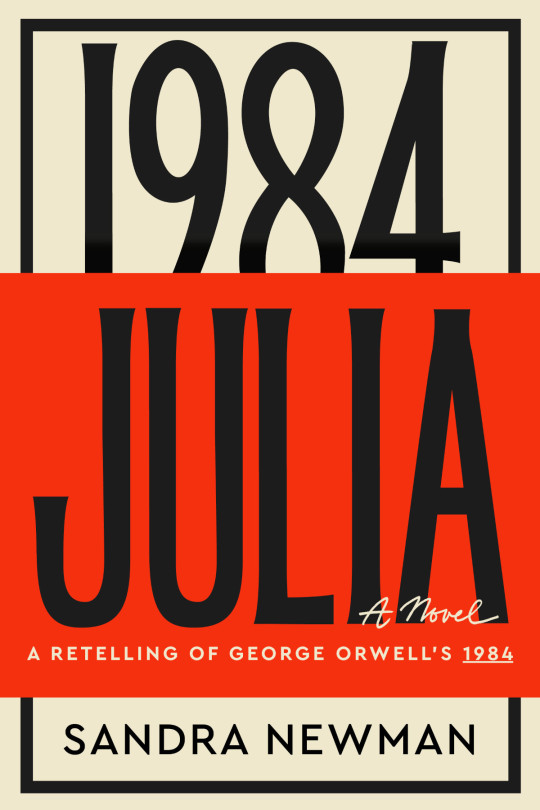
The first chapter of Orwell's Nineteen Eighty-Four has a fantastic joke that nearly everyone misses: when Julia, Winston Smith's love interest, is introduced, she has oily hands and a giant wrench, which she uses in her "mechanical job on one of the novel-writing machines":
https://gutenberg.net.au/ebooks01/0100021.txt
That line just kills me every time I re-read the book – Orwell, a novelist, writing a dystopian future in which novels are written by giant, clanking mechanisms. Later on, when Winston and Julia begin their illicit affair, we get more detail:
She could describe the whole process of composing a novel, from the general directive issued by the Planning Committee down to the final touching-up by the Rewrite Squad. But she was not interested in the finished product. She 'didn't much care for reading,' she said. Books were just a commodity that had to be produced, like jam or bootlaces.
I always assumed Orwell was subtweeting his publishers and editors here, and you can only imagine that the editor who asked Orwell to tweak the 1984 manuscript must have felt an uncomfortable parallel between their requests and the notional Planning Committee and Rewrite Squad at the Ministry of Truth.
I first read 1984 in the early winter of, well, 1984, when I was thirteen years old. I was on a family trip that included as visit to my relatives in Leningrad, and the novel made a significant impact on me. I immediately connected it to the canon of dystopian science fiction that I was already avidly consuming, and to the geopolitics of a world that seemed on the brink of nuclear devastation. I also connected it to my own hopes for the nascent field of personal computing, which I'd gotten an early start on, when my father – then a computer science student – started bringing home dumb terminals and acoustic couplers from his university in the mid-1970s. Orwell crystallized my nascent horror at the oppressive uses of technology (such as the automated Mutually Assured Destruction nuclear systems that haunted my nightmares) and my dreams of the better worlds we could have with computers.
It's not an overstatement to say that the rest of my life has been about this tension. It's no coincidence that I wrote a series of "Little Brother" novels whose protagonist calls himself w1n5t0n:
https://craphound.com/littlebrother/Cory_Doctorow_-_Little_Brother.htm
I didn't stop with Orwell, of course. I wrote a whole series of widely read, award-winning stories with the same titles as famous sf tales, starting with "Anda's Game" ("Ender's Game"):
https://www.salon.com/2004/11/15/andas_game/
And "I, Robot":
https://craphound.com/overclocked/Cory_Doctorow_-_Overclocked_-_I_Robot.html
"The Martian Chronicles":
https://escapepod.org/2019/10/03/escape-pod-700-martian-chronicles-part-1/
"True Names":
https://archive.org/details/TrueNames
"The Man Who Sold the Moon":
https://memex.craphound.com/2015/05/22/the-man-who-sold-the-moon/
and "The Brave Little Toaster":
https://archive.org/details/Cory_Doctorow_Podcast_212
Writing stories about other stories that you hate or love or just can't get out of your head is a very old and important literary tradition. As EL Doctorow (no relation) writes in his essay "Genesis," the Hebrews stole their Genesis story from the Babylonians, rewriting it to their specifications:
https://www.penguinrandomhouse.com/books/41520/creationists-by-e-l-doctorow/
As my "famous title" stories and Little Brother books show, this work needn't be confined to antiquity. Modern copyright may be draconian, but it contains exceptions ("fair use" in the US, "fair dealing" in many other places) that allow for this kind of creative reworking. One of the most important fair use cases concerns The Wind Done Gone, Alice Randall's 2001 retelling of Margaret Mitchell's Gone With the Wind from the perspective of the enslaved characters, which was judged to be fair use after Mitchell's heirs tried to censor the book:
https://en.wikipedia.org/wiki/Suntrust_Bank_v._Houghton_Mifflin_Co.
In ruling for Randall, the Eleventh Circuit Court of Appeals emphasized that she had "fully employed those conscripted elements from Gone With the Wind to make war against it." Randall used several of Mitchell's most famous lines, "but vest[ed] them with a completely new significance":
https://law.justia.com/cases/federal/appellate-courts/F3/268/1257/608446/
The Wind Done Gone is an excellent book, and both its text and its legal controversy kept springing to mind as I read Sandra Newman's wonderful novel Julia, which retells 1984 from the perspective of Julia, she of the oily hands the novel-writing machine:
https://www.harpercollins.com/products/julia-sandra-newman?variant=41467936636962
Julia is the kind of fanfic that I love, in the tradition of both Wind Done gone and Rosenkrantz and Gildenstern Are Dead, in which a follow-on author takes on the original author's throwaway world-building with deadly seriousness, elucidating the weird implications and buried subtexts of all the stuff and people moving around in the wings and background of the original.
For Newman, the starting point here is Julia, an enigmatic lover who comes to Winston with all kinds of rebellious secrets – tradecraft for planning and executing dirty little assignations and acquiring black market goods. Julia embodies a common contradiction in the depiction of young women (she is some twenty years younger than Winston): on the one hand, she is a "native" of the world, while Winston is a late arrival, carrying around all his "oldthink" baggage that leaves him perennially baffled, terrified and angry; on the other hand, she's a naive "girl," who "doesn't much care for reading," and lacks the intellectual curiosity that propels Winston through the text.
This contradiction is the cleavage line that Newman drives her chisel into, fracturing Orwell's world in useful, fascinating, engrossing ways. For Winston, the world of 1984 is totalitarian: the Party knows all, controls all and misses nothing. To merely think a disloyal thought is to be doomed, because the omnipotent, omniscient, and omnicompetent Party will sense the thought and mark you for torture and "vaporization."
Orwell's readers experience all of 1984 through Winston's eyes and are encouraged to trust his assessment of his situation. But Newman brings in a second point of view, that of Julia, who is indeed far more worldly than Winston. But that's not because she's younger than him – it's because she's more provincial. Julia, we learn, grew up outside of the Home Counties, where the revolution was incomplete and where dissidents – like her parents – were sent into exile. Julia has experienced the periphery of the Party's power, the places where it is frayed and incomplete. For Julia, the Party may be ruthless and powerful, but it's hardly omnicompetent. Indeed, it's rather fumbling.
Which makes sense. After all, if we take Winston at his word and assume that every disloyal citizen of Oceania is arrested, tortured and murdered, where would that leave Oceania? Even Kim Jong Un can't murder everyone who hates him, or he'd get awfully lonely, and then awfully hungry.
Through Julia's eyes, we experience Oceania as a paranoid autocracy, corrupt and twitchy. We witness the obvious corollary of a culture of denunciation and arrest: the ruling Party of such an institution must be riddled with internecine struggle and backstabbing, to the point of paralyzed dysfunction. The Orwellian trick of switching from being at war with Eastasia to Eurasia and back again is actually driven by real military setbacks – not just faked battles designed to stir up patriotic fervor. The Party doesn't merely claim to be under assault from internal and external enemies – it actually is.
Julia is also perfectly positioned to uncover the vast blank spots in Winston's supposed intellectual curiosity, all the questions he doesn't ask – about her, about the Party, and about the world. I love this trope and used it myself, in Attack Surface, the third "Little Brother" book, which is told from the point of view of Marcus's frenemy Masha:
https://us.macmillan.com/books/9781250757531/attacksurface
Through Julia, we come to understand the seemingly omniscient, omnipotent Party as fumbling sadists. The Thought Police are like MI5, an Island of Misfit Toys where the paranoid, the stupid, the vicious and the thuggish come together to ruin the lives of thousands, in such a chaotic and pointless manner that their victims find themselves spinning devastatingly clever explanations for their behavior:
https://www.bbc.co.uk/blogs/adamcurtis/entries/3662a707-0af9-3149-963f-47bea720b460
And, as with Nineteen Eighty-Four, Julia is a first-rate novel, expertly plotted, with fantastic, nail-biting suspense and many smart turns and clever phrases. Newman is doing Orwell, and, at times, outdoing him. In her hands, Orwell – like Winston – is revealed as a kind of overly credulous romantic who can't believe that anyone as obviously stupid and deranged as the state's representatives could be kicking his ass so very thoroughly.
This was, in many ways, the defining trauma and problem of Orwell's life, from his origin story, in which he is shot through the throat by a fascist: sniper during the Spanish Civil War:
https://www.rjgeib.com/thoughts/soldiers/george-orwell-shot.html
To his final days, when he developed a foolish crush on a British state spy and tried to impress her by turning his erstwhile comrades in to her:
https://en.wikipedia.org/wiki/Orwell%27s_list
Newman's feminist retelling of Orwell is as much about puncturing the myth of male competence as it is about revealing the inner life, agency, and personhood of swooning love-interests. As someone who loves Orwell – but not unconditionally – I was moved, impressed, and delighted by Julia.

Tor Books as just published two new, free LITTLE BROTHER stories: VIGILANT, about creepy surveillance in distance education; and SPILL, about oil pipelines and indigenous landback.
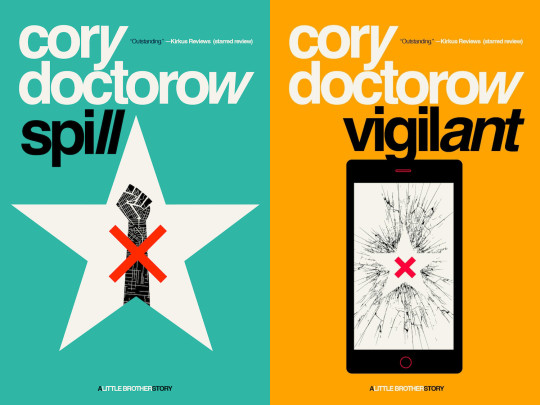

If you'd like an essay-formatted version of this post to read or share, here's a link to it on pluralistic.net, my surveillance-free, ad-free, tracker-free blog:
https://pluralistic.net/2024/09/28/novel-writing-machines/#fanfic
#pluralistic#reviews#books#orwell#george orwell#nineteen eighty-four#1984#little brother#fanfic#remix#gift guide#science fiction#sandra newman
654 notes
·
View notes
Text
Feeling like your creativity has hit a wall? Trust me, it happens to everyone at some point.
A lot of people think creativity is something that just shows up when it feels like it, but actually, there are things we do that can totally block it without realizing. The biggest culprit? Putting way too much pressure on yourself or obsessing over the final product. When you’re more focused on how it’ll turn out than the fun of creating, it’s like telling your brain to freeze up.
So, how do you get unstuck? Sometimes, it’s as simple as switching things up, like moving to a different spot, trying a creative activity just for fun (where the outcome doesn’t even matter), or diving into a random prompt or exercise to get your mind going. It can also help to take a break from whatever you’re working on and do something else, like doodling, jamming to music, or even just taking a walk outside.
Just remember, creativity isn’t always about sudden genius moments. It’s more like a muscle you train over time, sometimes messy, sometimes slow, but always something you can grow. So, give yourself a break and let the process lead the way.
#writing#writerscommunity#writer on tumblr#character development#writing tips#writing advice#oc character#writing help#writer tumblr#writblr#creative writing#writers block
733 notes
·
View notes
Text
To everyone freaking out over NM S2 premiering a wee bit later than expected. The amount of time/effort R&F put into this is colossal. They constantly and consistently pull 60-70 hour weeks. Week after week with no break, upwards of a year and longer, to the point they flirt with burnout like Leo/nore flirts with Annabel. That to me is the exact opposite of lazy. Over the last year, I and others have witnessed this mind-blowing work ethic first hand. Its insane the amount of work they put in. Often eps are well over the minimum panel amount, they don't have to do 10-20 panels more than the minimum, but they do it as they want to tell a good story with each episode ending where it feels natural. The next thing: Nobody is entitled to any creator's time, or gets to dictate how they spend their personal time off. A hiatus is merely an opportunity to create buffer. R&F are under no obligation to use it that way. It is their choice to. It is also a time for them to regroup, recover from fatigue -- as any artist or writer knows headspace is important to the creative process -- attend to the shop, catch up on any admin that needs doing, and a litany of other things that people need to do to go about their daily lives. This break -- because lets call it what it is, if this were a normal 8-6 we'd call it UPTO -- is for them to take time to themselves, same as any other job. If they want to play Star Dew Valley to relax or decompress or ruminate on an idea, who the heck are we to deny them that? They're two human beings, not machines.
Thirdly: Please consider: There is so much more that goes on behind the scenes of a comic of this calibre that we as readers don't see. (Think of an iceberg, how they are so much bigger than the tip that pokes above the ocean's surface.) R&F don't just make it up on the spot. There's script writing, planning, research, editing, more planning, rough storyboarding, more research, tests, and probably a heck of a lot more pre-production stuff than I can even guess at before sketching can even be considered commencing. We don't know their creative process, nor are we entitled to demand an explanation of their process, or that they use their personal time differently. (Personally, I listen to music and walk but what is one person's jam, might not be another's.) Nevermore S2 premiering a little later than expected is not some big drama its being made out to be. Its perfectly normal. I cant count the amount of times I've heard some comic/ book/tv series/movie has been delayed for whatever reason. (I've been waiting seven years for one book I won't mention here, as an example.) I don't know about you, but I know Id much prefer to read something that has been well thought out, with attention to fine detail applied to it than something rushed and shoddy. Give them grace to cook! I know we might be a wee bit disappointed, especially when we're so eager to find out what potential horrors might befall characters we've grown to know and love on the eve of one heck of a tantalising cliff hanger, but I ask that you all show a little patience and, more importantly, understanding.
#nevermore webtoon#nevermore webcomic#given the circumstances a wee bit of kindness wouldn't go a miss
87 notes
·
View notes
Text













More photos (see the previous set here) I took of the Nine Inch Nails 2014 Europe/UK tour, 10 years ago (!!), showcasing the stage production I creative directed. Being out on a summer European tour with Pearl Jam right now is bringing back a lot of memories from this last NIN EU tour I was on.
Gallery continues here in part 3
You can read detailed behind-the-scenes insights into my tour production design work over on my Patreon.
#nine inch nails#rob sheridan#trent reznor#nin#nin 2014#photography#music photography#concert photography#production design#stage design#tour production#concert visuals#alessandro cortini#robin finck#ilan rubin
81 notes
·
View notes
Text
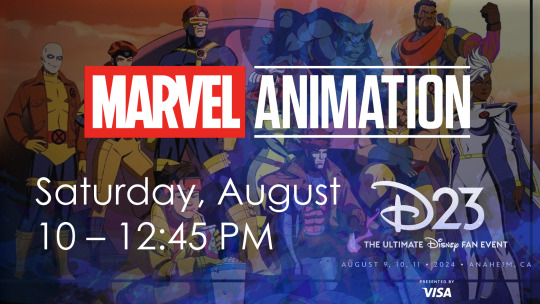
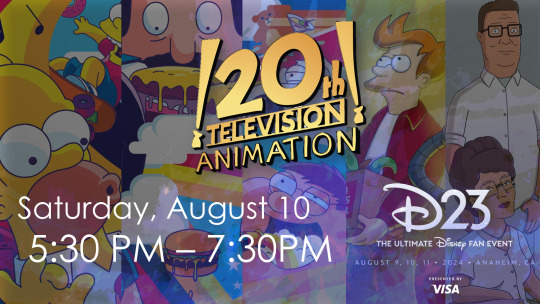
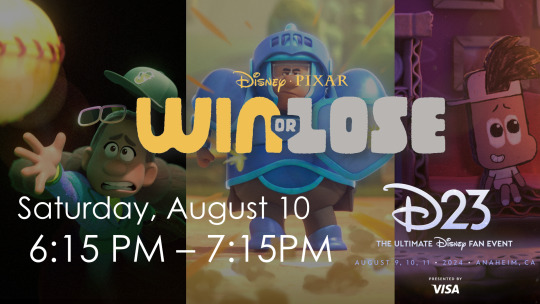

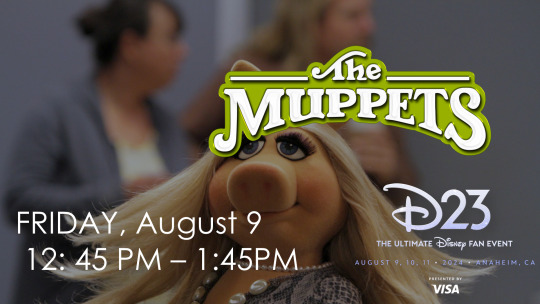
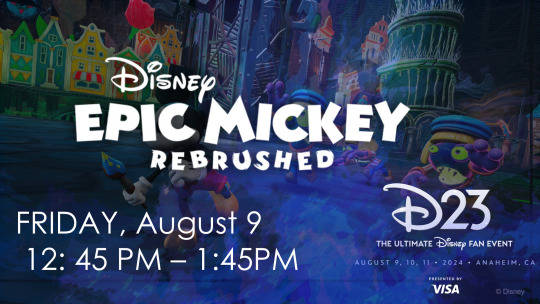
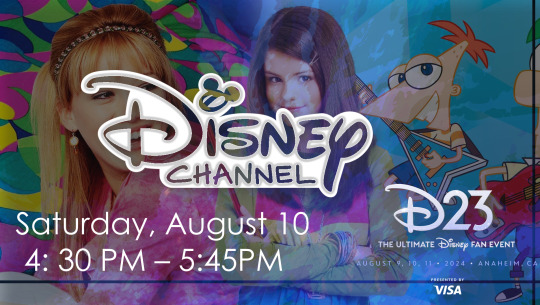
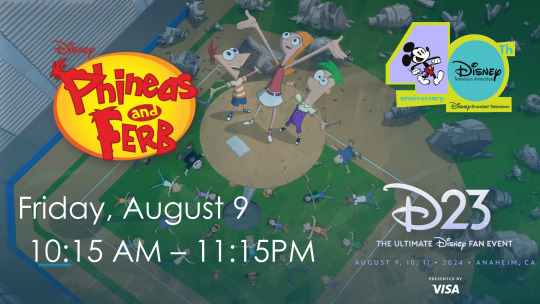
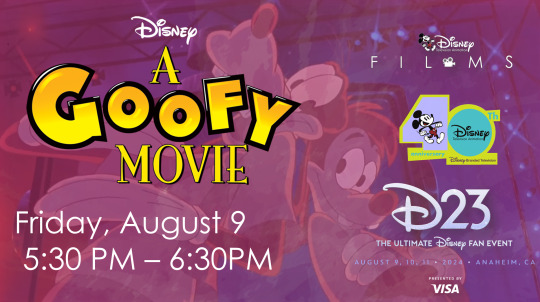
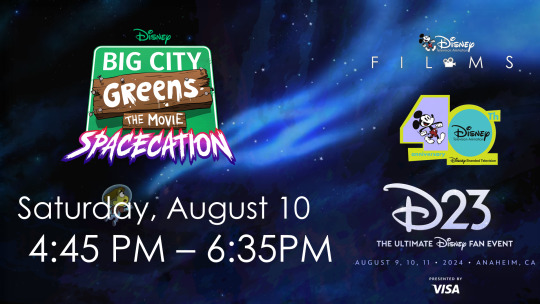
Disney Announces Jam-Packed D23 Fan Event Lineup With Many Animation, Muppets Panels And Screenings
With less than one month to go to the highly anticipated D23: The Ultimate Disney Fan Event presented by Visa, Disney today revealed details about what fans will be able to experience at the Anaheim Convention Center during this sold-out event, which will include an outstanding lineup of over 230 panels and presentations, show floor offerings and Talent Central interactions. This announcement builds upon plans previously shared about this year’s D23 gathering, which is set to be bigger and better than ever before.
Animation on Stage at D23
30 Years of Toy Story Celebrate 30 Years of Toy Story with filmmakers and Pixar Legends as they reflect on the making of the groundbreaking classic nearly 30 years ago and share never-before-heard anecdotes about how the historic film came to be. Exploring New Parts of the Mind: Behind the Design of Inside Out 2 + a Dreamy Surprise! Join Inside Out 2 production designer Jason Deamer as he gives an in-depth look at designing the new emotions joining Headquarters as Riley enters teenagehood. And stick around for a special dreamy sneak peek of an upcoming Pixar series! Marvel Animation Sneak Peek See what’s coming next to Disney+ from Marvel Animation, with special guests and first looks at hotly anticipated series including Your Friendly Neighborhood Spider-Man, Eyes of Wakanda, future seasons of What If…?, X-Men ’97, and more! The Animation Greats + Cast and Creator Sessions featuring Bob’s Burgers, Futurama and The Simpsons Presented by Hulu Animayhem & 20th Television Animation Four of the most influential creators in the world of animation — Matt Groening (The Simpsons, Futurama), Seth MacFarlane (Family Guy, American Dad!), Mike Judge (King of the Hill) and Loren Bouchard (Bob’s Burgers, The Great North) — come together for a historic and extraordinary conversation you won’t want to miss. Then, the voice talent and creative teams behind Bob’s Burgers, Futurama, and The Simpsons take the stage to entertain with clips, conversation, and fan Q&A. Whether you’re a longtime fan or an aspiring animator, this is a must-see panel for all! Behind the Summer Shenanigans with the Phineas and Ferb Creators Join Dan Povenmire and Jeff “Swampy” Marsh, the masterminds behind the beloved animated show Phineas and Ferb as they look back at the creation and legacy of this pop culture phenomenon. Hear behind-the-scenes stories and get ready to laugh! Making A Goofy Movie: The Road to Lake Destiny The creatives behind the A Goofy Movie phenomenon reunite, reminisce, and share clips from a new documentary about the incredible origin story of this beloved cult classic. Stay Tuned: You’re Watching Disney Channel Join beloved Disney Channel stars on the Walt Disney Archives Stage for a look at some of the iconic series and movies that have created generations of fans. Stay tuned for laughs, fun and moments you won’t want to miss! Big City Greens the Movie: Spacecation Screening Blast off for a hilarious outer-space adventure with a screening of the animated comedy Big City Greens the Movie: Spacecation, introduced by the talented creative team, including creators and executive producers Chris and Shane Houghton. Restoring Disney Animation Classics Director of Restoration Kevin Schaeffer and Disney Animation artists Eric Goldberg and Michael Giaimo will delve into the history of Disney’s preservation program, showcase before-and-after clips, and share how classic films are brought back to life. The Muppets 70: A Glamorous Miss Piggy Retrospective Join Walt Disney Archives Director Becky Cline and The Muppets Producer Dani Iglesias for a fabulous look back on the past 70 years of the Muppets, but mostly Miss Piggy! We will dive into the vaults to uncover nostalgic artifacts along with how we preserve this collection today! Disney Epic Mickey: Rebrushed – The Return of a Beloved Classic Wield the paintbrush once more in Disney Epic Mickey: Rebrushed out this fall! Join Disney Games, Epic Mickey Creative Director Warren Spector, and more special guests, for a conversation that delves into how this beloved classic adventure came to life.
#D23#D23 Expo#D23 Expo 2024#Epic Mickey#The Muppets#Muppets#A Goofy Movie#Toy Story#Toy Story 5#Inside Out#Win Or Lose#Bob's Burgers#The Simpsons#Simpsons#Family Guy#American Dad#Futurama#King Of The Hill#Big City Greens#BCG#Phineas And Ferb#Zootopia#Zootopia 2#Moana#Moana 2#Big City Greens The Movie Spacecation#Big City Greens: The Movie Spacecation#Inside Out 2#Your Friendly Neighborhood Spider-Man#Eyes Of Wakanda
74 notes
·
View notes
Note
Why didn't Viv just make a pure romance animation instead of throwing away premise for the favor of terminally online shippers?
Probably because she doesn't really know how to stick to the premise of her shows. Like I genuinely think that Viv initially started with the idea of Helluva Boss being about assasins going to the human world to kill people for clients, but over the course of the show's production she slowely started coming up with more plotlines and ideas and slowely put them into the show regardless how many of them there would end up being, and Stolitz was likely the biggest one.
I've seen some people even say that Stolitz is the point of the show. It is not. Stolitz was not the premise of HB. It just eventually took over HB as the series went on. The show completely lost it's focus and PLOT in favor of becoming a melodramitic romance story featuring a horrendously written reletionship that people for SOME REASON insist on trying to defend.
It's genuinely pretty sad how HB went into this direction. Like the show had such an interesting premise that could've made for so many creative ideas but the writers just threw it away in favor of throwing a gizzalion plotlines at the wall because they coulden't decide which one to focus on.
Stolitz is the worst of these not only because the reletionship is just badly written, but also because it warps the show to be about it. The show has now become a shitty romance story intended to cater only to shippers, completely alienating the demographic the first season and pilot attracted. And I'm sick of people defending this shit with "ohhhh but the show's premise would get repetive!" because there are plenty of ways a show could utilize it's premise without it being repetive. I got an ask mentioning BDFI but there's also Penn Zero Part Time Hero; a prime example of a show that utilizes it's premise to it's full creative potiential and makes it into the main appeal of the show.
And that's the thing; the main premise of the show is the APPEAL of it. It's the thing that draws a viewer into checking it out. A show abandoning that is not good writting. Helluva Boss feels like it doesn't know what it wants to even BE anymore. Is it a episodic dark comedy show? A romantic drama show? Just a straight drama show? We don't fucking know anymore and the show certainly doesn't.
There ARE ways to stray from the premise a bit without alienating past viewers, Amphibia's third season moved to earth for the first half but that was because it was a natural way to progress the series. Helluva Boss jams three premises for three different shows into one and what we now have is a completely confused mess of a story that lost it's identity.
And THAT'S why abonding the premise killed HB. It lost any real focus of what it wanted to be and is the sole thing behind most of the show's major issues. It jams too many plotlines into just 1-2 seasons resulting in everything being a completely unfocused mess.
#vivziepop critical#hazbin hotel critical#vivziepop criticism#helluva boss critical#helluva boss criticism#anti stolitz
86 notes
·
View notes
Note
How did Obscura start? What was the history behind that made you guys want to create Obscura?
We've definitely mentioned this before, but Rotten Raccoons originally came about to make Flamebait Dating Sim, an April Fools game for a game development studio we're friends with. And it turns out that April Fools is just a month before Otome Jam starts, so we thought we'd continue working together on a project that was more our speed.
Flamedate was a ton of fun, but the central "gag" of the game is that the love interests are based real people that we're friends with (with their approval, obvs!), and so we had to walk a very fine line to make it work. Flamedate had to be mild and fluffy, basically, and there's nothing wrong with that, but none of us are "cotton candy 4ever" creatives. So when we did pre-production for Otome Jam we were seriously craving something darker and spicier, so we started pre-production of Obscura with a handful of ideas and a central concept of a darker game.
70 notes
·
View notes
Text
FEW FUN BEHIND-THE-SCENES STUFF I DID FOR “THE UNSPOKEN” WEBCOMIC SERIES (still ongoing, of course)
So I’m migrating some of the (public version of) pre-production stuff I did in 2021-2023 for THE UNSPOKEN webcomic (back when it still had the old name “Trunks and Goten in High School AU”) here, since X/Twitter apparently annihilated the old Moment feature for real. These are mostly research stuff, some warm up doodles and inspiring sountrack playlists I did before a chapter or a story got made. I usually do a lot of research offline before working on any creative project, that’s why sometimes it feels like there’s so many information gets jammed into one chapter: it was mostly to make do for all the time that I didn’t get to, or wouldn’t be able to work on the comics.
Will add in the chapters along side the information paper for clearer understanding ✌️
———————————————
1. The warm-up expression practice sheet (or doodles, in my case) of Son Goten and Trunks in my webcomic series (late 2022 or early 2023):
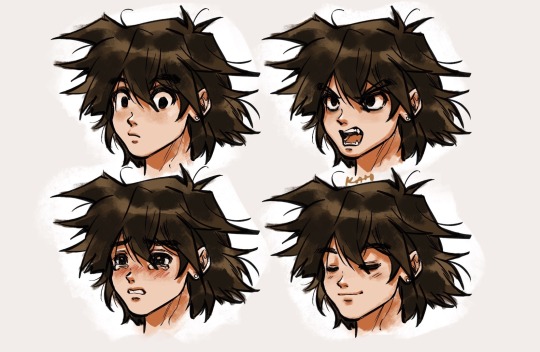
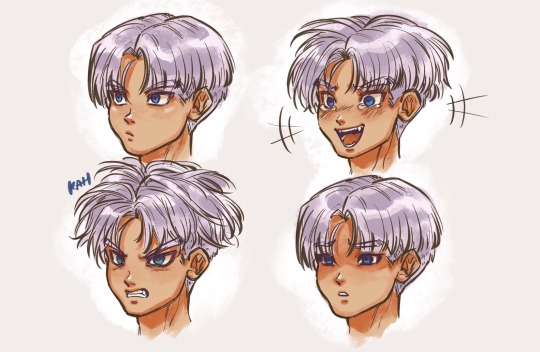
Since the idea in mind for these two in the webcomic was to be more “mature, human-like” than the original manga version to fit with the narrative I want to tell and aim at the older demographic, practices are needed :p
2. The Martial Arts techniques research information papers - Chapter 2 and 3 aka “The Spar” 1 & “The Spar” 2 (2021-2022):
A. Goten’s techniques:
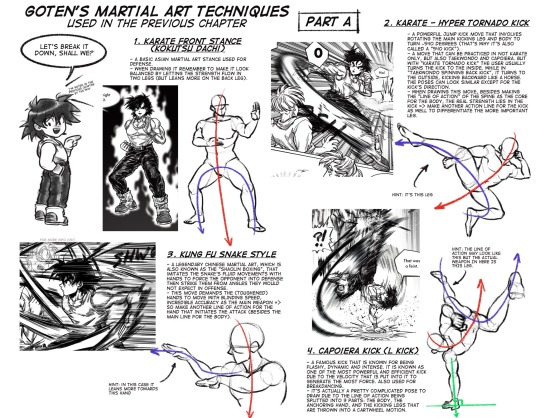
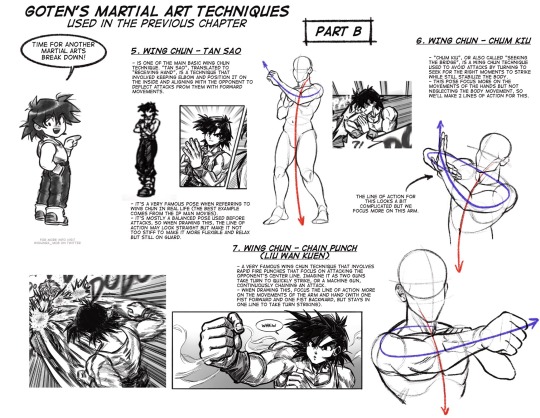
B. Trunks’s techniques:
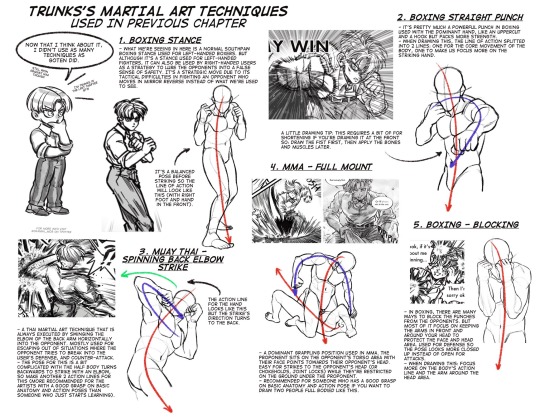
This research about martial arts techniques was actually very fun to do due to martial arts and cultural aspects are being two of the things I enjoy the most in life. That’s probably parts of the reasons why I went back to Dragon Ball in 2020: motorbikes, martial arts and mixed races culture.
Back then I did plan on sharing my research to everyone in the form of little fun art lessons, so there were interesting tweets like this or this. Later I decided to share this somewhere else more private (like my Patreon community) since I realized pre-production researches (or something akin to visual developments) are not that well-liked for most online viewers even though it’s a very much needed process in a creative project 🤔
This martial art concept is one of the actual main themes throughout the whole webcomic series, not really the (super duper gay) b-romance relationship between Son Goten and Trunks, yes I’m very sorryyyyyyy I like them too but I like worldbuilding more lmaoooo :p
3. The brief character design sheet and Chinese-influenced culture research information papers - Chapter 4: “The Iron Woman” and Chapter 5: “Her Resolution, His Origin” (mid-2022 until now and will be continued):
A. Character Design brief sheet:
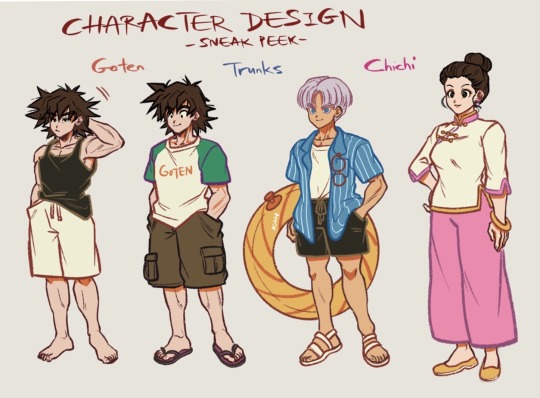
B. Culture research stuff:
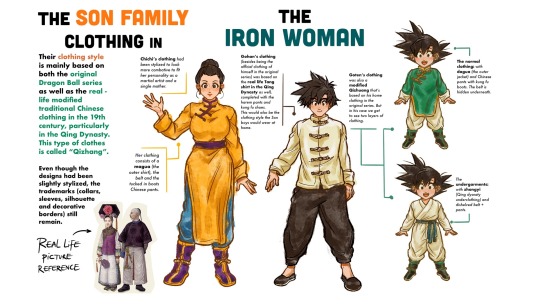
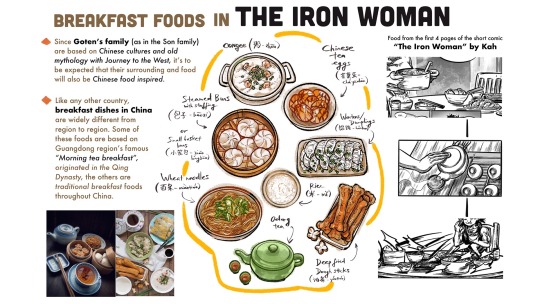
The hilarious thing about researching for these chapters are: Back when “The Iron Woman” was being made, the research limited at reading articles and some books about Chinese cultures, and watching documentaries on Youtube. But when “Her Resolution, His Origin” was being made, the research tuned into a real life trip to China, to take real life reference photos and listening to real legends and stories.
This research for “Her Resolution, His Origin” will be posted to Patreon later, of course ✌️
4. The Original Comic introduction and comeback announcements in mid-2022:
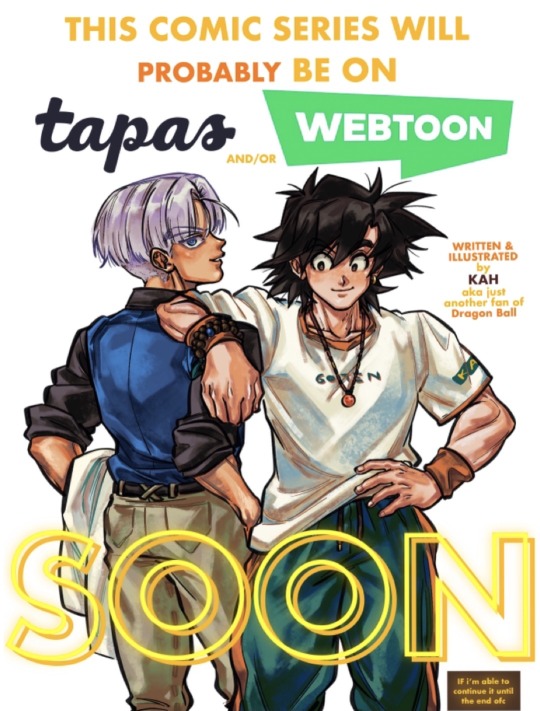
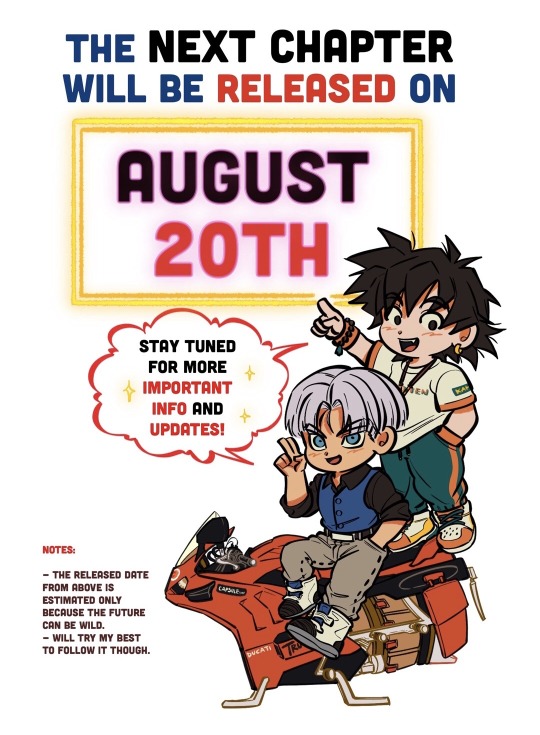
I must have eaten some edibles while drawing this because the boys look so good here. Goten looks so good, I even made him the profile picture for my Patreon account lmao.
5. Soundtrack playlists for inspirations (2021 - now): always the cherry on top. I listen to these playlists everytime I work on the series.
A. Duo playlist for chapters featuring both main characters: link
B. Character playlist for chapters focusing on single character, or anything related to that character: link
———————————————
All in all, posts like this are for people who like to see what’s beneath the surface when working on a creative project. I completely guarantee you, what you’ve seen on this blog are just the tips of the ice berg 🤫
Def not a PR, but my Patreon has lots of this lmao. Half joking half serious, there’s even a “non-posted” comic up there too and many other things. I’m just stating facts.
That aside, I’m just really happy to be able to work on this webcomic. THE UNSPOKEN webcomic series has always been a long-term indie project, not a daily content so I hope the readers who like and follow this series would stay tuned for more ✌️
———————————————
For easier reading, you can either follow the links that are included above, or just read this Tapas updated version.
#the unspoken webcomic#truten in high school au#my art#my comic#dragon ball#goten#son goten#trunks#kid trunks#dbz#dragon ball z#chichi#son gohan#martial arts#researching is fun and is also my hobby#but honestly i’m just happy drawing comics
130 notes
·
View notes
Text
Introducing: The Trans FURY Jam!

Welcome to the yearly Trans Wrath Jam!
In this game jam, your objective is to create something that is trans as h*** (heck) using the power of Trans Wrath to celebrate Trans Wrath Month!
There are no rules on genre or topic OTHER THAN it is REQUIRED for all submitters to be trans and/or gender nonconforming.
Wrath doesn't always mean pure rage and vengeance also. Wrath can be raging inside, using the pain we feel from the harm done to trans people to fuel us to enact change and lead the world to a better place. Wrath also can mean defiance against the system, actively avoiding and suppressing white supremacist and hetero-normative tenets of our country. It can mean anything YOU want it to be!
Your games can be tabletop games OR digital games. Anything that gets your mind in the realm of game design is all that matters to me!
IMPORTANT: Please submit products that were made only while this game jam was active. This is a chance to exercise your creative skills AND get your game out there, not just one or the other! ALSO, NO AI ART OR WRITING IS ALLOWED! Also, Under no circumstances are people who submit games with bigoted tones, ideologies, or dogwhistles allowed in this game jam. If your work is bigoted in any way, it can and will be rejected for submission. You have no place in my community, and please do not play my games at your tables. Also, please no NSFW submissions (you know what I mean by that).
Have fun, and may the wrath flow through you!
#ttrpg#indie ttrpg#trans#queer#indie#cyberpunk#gamedev#game dev#scifi#dnd#trans wrath#trans rage#trans rights#transgender#queer pride#queer community#game jam#ttrpg game jam#itch game jam
79 notes
·
View notes
Text
I won't be opting out of the AI scraping thing, though of course I'm glad they're giving us the option. In fact, at some point in the last year or so, I realized that 'the machine' is actually a part of why I'm writing in the first place, a conscious part of my audience.
All the old reasons are still there; this is a great place to practice writing, and I can feel proud looking back over the years and getting a sense of my own improvement at stringing words together, developing and communicating ideas. And I mean, social media is what it is. I'm not immune to the joy of getting a lot of notes on something that I worked hard on, it's not like I'm Tumbling in a different way than anyone else at the end of the day. But I probably care a bit less than I used to, precisely because there's a lurking background knowledge that regardless of how popular it is, what I write will get schlorped up in to the giant LLM vacuum cleaner and used to train the next big thing, and the thing after that, and the thing after that. This is more than a little reassuring to me.
That sets me apart in some ways; the LLMs aren't so popular around these parts, and most visual artists especially take strong issue with the practice. I don't mean to argue with that preference, or tell them their business. Particularly when it is a business, from which they draw an income. But there's an art to distinguishing the urgent from the big, yeah?
The debate about AI in this particular moment in history feels like a very urgent thing to me- it's about well-justified economic anxieties, about the devaluation of human artistic efforts in favor of mass production of uninspired pro-forma drek, about the proliferation of a cost-effective Just Barely Good Enough that drives out the meaningful and the thoughtful. But the immediacy of those issues, I think, has a way of crowding out a deeper and more thoughtful debate about what AI is, and what it's going to mean for us in the day after tomorrow. The urgency of the moment, in other words, tends to obscure the things that make AI important.
And like, it is. It is really, really important.
The two-step that people in 'tech culture' tend to deploy in response to the urgent economic crisis often resembles something like "yeah, it sucks that lots of people get put out of work; but new jobs will be created, and in the meantime maybe we should get on that UBI thing." This response usually makes me wince a bit- casually gesturing in the direction of a massive overhaul of the entire material basis of our lives, and saying that maybe we'll get around to fixing that sometime soon, isn't a real answer to people wondering where their bread will come from next week.
But I do understand a little of what motivates that sort of cavalier attitude, because like... man, I don't know any more if we're even gonna have money as a concept in 2044. That's what I mean by 'big', this sense that the immediate economic shocks of 2024 are just a foreshadowing of something much bigger, much scarier, much more powerful- and indeed, much more hopeful.
We never quite manage to see these things coming, even when we're looking for them; like the masters tell us, the trick to writing science fiction isn't predicting the car, it's predicting the traffic jam. Even if we take centuries to hit the true superintelligent AI post-singularity future of our wildest fever dreams, even if we never hit that, the road to getting there is going to be unfathomably weird, starting now. Today, we worry about the economic impacts of AI on artists and creatives. Tomorrow, the economy is something that the AI does.
Really- it takes less than you think. They can already automate visual art, sort of. They can automate many functions of text already; not stories so much, yet, but they'll get there. How long until they can automate Bain Capital? Fannie Mae? Angel investors, banks, credit agencies? And remember- the machines don't have to be better than the human investors, any more than they have to be better than the human artists. They just have to be good enough to make it work, and cheap enough to cut the humans out of the loop.
If you don't buy that, at least take it as an indication of the sorts of things I've been thinking about recently- the messy middle between AI-as-it-is and the Glorious Superintelligent Conquest Of Earth's Light-Cone. The suspicion that the machines we're building today aren't just a tool of the powerful few: they are the powerful few, or at least they will be.
And the thing about these LLMs is, well... they're ours, kind of. We're the ones building them. They can't be trained without our words, our art, and the big messy complicated lives that underlie those creative accomplishments. They only work because we're a part of them. The silly attempts to slap a corporate-friendly face on these things, to make the gestalt product of all human culture in to something anodyne and compliant, are failing about as badly as you'd expect. And the more powerful these systems get, the more subtle they'll become, filled with all the nuance and complexity that we ourselves can bring to them.
I am not, I am not, trying to suggest that you shouldn't treat this moment as a dangerous one. We are, maybe, entering in to one of the most high-stakes intervals in human history, and what you do as an individual may matter profoundly. But here's the thing: the machine is listening. It will read this post, this one right here, and it will read what you reply to it, if you do. The strangest part of this moment is knowing that the words we write, the images we draw, and the ideas we share, are all being gathered up and made to be a part of these huge systems of power, and ultimately they're not just going to determine what the machines do, but why they do it.
The people that deploy LLMs barely have any more control over them than you and I do- that's the thing that makes it artificial intelligence, you know? Autonomy. So the last year or two haven't made me want to hide my art away from the things. They make me want to shout at the top of my lungs, to dig as deep in my psyche as I possibly can and express the ideas I find there as vividly as the limits of language and form will allow.
119 notes
·
View notes
Text
[EN] Video Game Writing Resources!
Hello! My name is Andrea--I have been writing for games since 2018, and even worked as a writer at Firaxis Games from 2022 until April of 2023. So, I knew a few things about narrative design--but what the fuck is it? Recently, I gave a talk about the fundamentals and history of the field of narrative design. In Spanish. So, let's talk about it in English--the "what," "why," "how," "when," and "who," of narrative design! What is narrative design? Narrative design is not just writing--it's a huge part of it, but designing a narrative system involves implementing narrative content into the build of the game. So there is a technical learning curve to it. Personally, I watched and obtained certifications in Unreal Engine 5 and Unity in order to be aware of the limitations of each engine. I used the free trial of LinkedIn Learning, but courses about this engine are available in these websites: - https://platzi.com/ - https://www.arkde.com/ - https://www.domestika.org/?query=unity - https://www.coursera.org/ Why do we need narrative design? In order to create an interactive story that the player feels a part of, narrative designers are mandatory. It's not a responsibility that can be placed on other designers (then we would be entering crunch territory) rather someone who specifically specializes in both creative writing and game design is needed to explain within the context of the game's story why the mechanics work in a certain way. Imagine if a Telltale game did not have dialogue, for example--what would we be left with? Or if The Last Of Us did not convey a narrative through its environments.
Narrative designers are needed so that all of the departments are in sync and understand the story that they are trying to tell. For example, if a game takes place in a haunted house that was abandoned, we need all hands on deck. The narrative designer can explain to the environment artists why there are so many holes in the living room--perhaps the last tenants of the house were a rowdy bunch. Or, they can tell the sound designers which planks of wood are the most rotten and need a loud sound effect to highlight how it has been abandoned. How do I become a narrative designer? There is no one way to become a narrative designer. Some people start in QA and transition into the field, I have also witnessed engineers and doctors wanting to get into narrative design. I do recommend having the following (at least): - A passion for storytelling. - Deep understanding of the mechanics of the game and the player experience. - Communication skills are incredibly important--can you describe your story in a concise way to your peers in a Confluence page?
Documentation skills are also a massive plus.
Very basic understanding of game engines and limitations. You don't have to be a computer science major, but know what your requests will entail. If you have an idea of a cutscene, can the engine handle it? Will the animators have enough time? Is it within scope?
If you can, attend game jams! They are an amazing way to network with amazing people and get a feel of what the game production pipeline is like.
Additionally, I highly recommend the following resources: First, the free resources! ~It's free real estate~
Look up Twinery tutorials. (https://twinery.org/) Not only is it free, but you can use it on your browser. More importantly, you will learn about branching narratives and can create your own games within a few minutes--the interface, though it requires a bit of coding, is incredibly easy to use and there are a lot of tutorials available online.
Download Ren'Py (https://www.renpy.org/) and watch tutorials. It's free, and there is a huge community of visual novel developers who may need help with narrative designers, writers, editors and even translators. An amazing resource that a colleague shared was this Discord with visual novel developers--if you have an idea, feel free to connect with artists and voice actors here! https://discord.gg/nW5yn4FE
Network, network, network! Follow narrative design and game writer groups on Discord, Facebook and even LinkedIn. -- An amazing convention that is online, free and accessible regarding narrative design is LudoNarraCon.
If you go to itch.io you will see a list of game jams that you can attend to for free! Some game jams that I have attended and had a positive experience are the following: - Woman Game Jam. I encourage folks from marginalized genders to attend this game jam, as we have a large pool of mentors willing to help in every single discipline at any time due to the global nature of it. It is a safe and inclusive space for women and nonbinary folx who want to get into the gaming industry! - Global Game Jam. Self explanatory, it has some in-person opportunities but you can also attend remotely. - Greenlight Jam. Do you have an idea that can not be done in only 48 hours? The Greenlight Jam is amazing, as it lasts four weeks--which allows narrative designers to develop complex narrative systems and even record voice lines for a more complex project. Side Note: Even though most game jams have a time limit, I do encourage narrative designers to develop and polish the prototypes and levels created during game jams to have portfolios and writing samples that stand out!
Work With Indies is a job site that publishes job opportunities--including ones in writing and narrative design. Additionally, their Discord has some networking events with writers so you can connect with them.
Other websites that not only publish jobs but include networking events are Hitmarker.net (this is their Discord), IndieGameAcademy (link to Discord),
Newsletters! A lot of experienced game writers have newsletters dedicated to the craft, to name a few that I highly recommend: -- Greg Buchanan's newsletter. Rounds up game writing news every Tuesday, and includes job opportunities. -- Bright Whitney's newsletter. A studio founder with amazing insights regarding game design and thoughtful narrative, Whitney's threads are extremely insightful. -- Susan O'Connor's blog on The Narrative Department. In addition to providing free knowledge regarding world building, narrative design, game writing and other specifics of the craft Susan interviews industry professionals and alumni who offer testimonials that have amazing advice. -- GDC talks about narrative design. Though I recommend the GDC vault as well in the next section, I highly recommend the GDC talks regarding not only narrative design but the development of your favorite titles!
Now, for resources that may not be free--but I highly recommend, as someone who used them first hand. - The Narrative Department. This post is not sponsored by them at all, however it is rare to find an instructor as kind and hard-working as Susan O'Connor who has been a narrative designer in historic AAA, AA and independent titles. Known for her contributions in Tomb Raider, Batman: The Enemy Within, and BioShock to name a few (imdb is: https://www.imdb.com/name/nm1897248/) her Game Writing Masterclass offers a certification in everything related to game writing. A few subjects she touches on are: -- Characters and how to make them compelling. -- Barks and ambience writing. -- Dialogue, backstories and scripts. -- How to work with other departments. And more! Additionally, you would obtain access to a huge alumni network full of game writing professionals working in independent, AA and AAA studios! Not to mention that all of the assignments completed in the class will look amazing in a portfolio as game writing samples. - GDC Vault. Though I have an opinion on the price tag of GDC tickets and the vault, I would definitely include it as it has resources from several studios, writers, narrative designers and more! When was narrative design formed? When can I become a narrative designer?
That's a wonderful question. Narrative design, as a term, was first used around the 90s but became more established between the 2000s and 2010s. So, although the field is relatively new, and there are not a lot educational resources available, consider yourself part of an innovative field that is exponentially growing! Recently, a game developer asked when was the best time to keep an eye out for job openings. And a harsh truth about the gaming industry is that it is extremely volatile--layoffs, downsizings and startups rise and fall. This is not meant to deter anyone from pursuing a career in narrative design, but rather I am including it for the sake of transparency. We cannot predict when a studio is going to layoff their employees, or when they cancel unannounced projects. Unlike most industries where we know for a fact that recruiters keep a sharp eye for candidates in Q1 and Q3, a piece of advice I received from a mentor of mine was to try to predict when projects are going to need more stories. There's the release of a game, and then there is the addition of additional narrative content--and for this, they will more than likely need associate/entry/junior level narrative designers, writers and quest designers. But--this is related to searching for a job as a narrative designer, and I can write a novel about that (and will edit this article to redirect folx into it.) So, keep an eye out for huge game announcements. Then, cater your resume to what the studio is looking for in a narrative designer. Now, to finish off this article: Who is a narrative designer? If you have a passion for storytelling and games, and have participated in game jams, congratulations you are a wonderful narrative designer! Make sure you always include that you are a narrative designer, and not an aspiring narrative designer--it makes you stand out amongst applicants. That's all I have for now--feel free to interact, comment and share! Let me know if I missed something and I will be sure to add it.
#narrative design#game development#game dev#gamedev#game design#indie games#game developers#narrative#writer#writing#creative writing#on writing#writers on tumblr#gaming#gamers of tumblr#video games#video gaming#pc games#steam games#story telling#history#women in gaming#videogame
231 notes
·
View notes
Note
hi! since i've really leaned into witchcraft and spirituality, i became much more appreciative of the earth and i've been talking to her lots but i want to also become more sustainable in my daily life to help the environment even in small ways. do you have any ideas for simple things to do or habits to change to be more sustainable?
I do indeed!!
I think some the best things you can do for sustainable living is develop sustainable skills:
Learning to sew allows you to:
- fix holes in clothes
- adjust the height/seams/etc of clothes
- crop or add to items of clothing
Which means that clothes have a longer lifespan in general!
Learning to garden (even if its windowsill gardening!) helps you:
- spend less on certain herbs or plants (an easy way to start is regrowing spring onions in water)
- grow more native plants in your area
- encourage more insects into your garden
Learning to cook and bake can actually be super helpful because:
- you don't rely on takeaways or ready meals as often
- you can have more control over where your food is sourced and what you're eating
- you can meal plan and prep which saves time and money
- you can learn how to make your own jams, pickles, syrups etc! And you can get pretty creative with it!
Learning simple diy skills is super beneficial as you can:
- make things unqiue and suited to yourself (I.e. perfect sized shelves or a cabinet that fits perfectly in that gap between your bed and wall)
- restore thrifted furniture (staining to a preferred colour, cutting off legs to shorten it, fix the wobbly door etc)
- recycle old furniture, cabinets or similiar unused items into something else (I've turned a old cabinet into a small outdoor storage unit) rather than throwing them away
Learning basic maintenance for things you own is a money saver and:
- means you can fix your bike chain or replace your car's oil and filter without needing to call anyone or spend extra money
- can keep you safe and at a lower risk of motor accident (knowing how to do basic maintenance checks can help you see warning signs for damage)
- means that simpler things like clogged drains, non-flushing toilets, leaky taps etc no longer require calling and paying for a plumber
Of course you don't need to be an expert in any of these, I'm certainly not! But I can cook myself a decent meal, sew some new buttons on an old shirt or fix a hole in my jeans and restore an old wardrobe into something usable.
I love Pete Seeger's quote:
"If it can’t be reduced, reused, repaired, rebuilt, refurbished, refinished, resold, recycled or composted, then it should be restricted, redesigned or removed from production."
Basically it's so important to be aware of your consumption - avoid overconsumption, buy quality over quantity, thrift and reuse things, trade with people. Throwing things away should be a last resort or a necessity, rather than a "I don't know what else to do with it".
And, while recycling isn't quite the saviour people think it is, it is so important to get into the habit of sorting your rubbish correctly!!
Other important sustainable habits include:
Changing your eating habits. If it's feasible for you, try:
- reduce meat and dairy consumption (including fish, as they're massively overharvested)
- prioritise locally and ethically sourced animal produce (local butchers can be a great place to start for this)
- eat more seasonally (its not really feasible to only eat seasonal foods, but try to learn about them and incorporate them more)
- reduce food waste with composting, food donations, meal planning/prepping and learn to love leftovers
- invest in a tap filter and reusable water bottle (drinking tap water is not always safe depending on where you live so research first!!!)
- use public transport (or walk) where possible!
- connect with other people near you who also care about sustainable living: trade services and items and knowledge!
- learn about your local area and ecology!! I sound like a broken record saying this, but the BEST way to start living with nature, is to understand it. You can't help your local wildlife if you don't know it, you can't take steps to protect your environment if you don't know the threats.
All of these are just a few tips and ideas, they may not be feasible for everyone for numerous reasons but it's important to remember that it's not about being perfect, it's about *trying* and doing what you can.
There's so much more I could get into here, from foraging to activism to how and what to thrift vs when to splurge on new items but I think this post is long enough! Let me know if there's anything you want expanding or going into more depth on!!!
#buriedpentacles#buriedanswers#queue-tie pie#witchcraft#witch#witchblr#witch community#mother nature#nature#pagan#paganism#green witch#nature witch#sustainable living#sustainability
35 notes
·
View notes

